study tour
HORT ON TOUR
What happens when a group of Australians walk onto a farm in Europe? It’s no joke, but a strong cultural exchange of ideas.
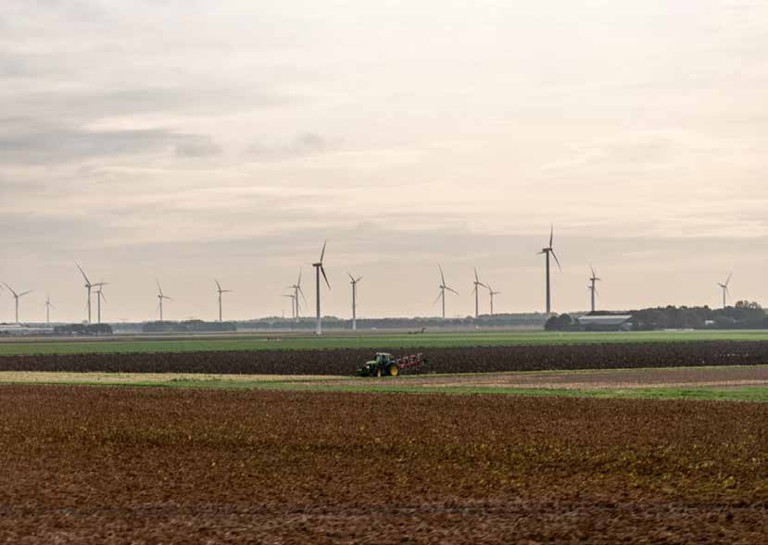
Farm of the Future, near Lelystad in The Netherlands, a research and demonstration site of renowned horticulture research hub Wageningen University.
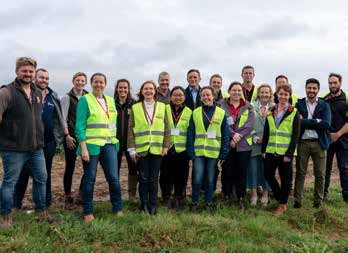
THIRTEEN growers and industry representatives travelled to Europe as part of AUSVEG’s ATMAC European Study Tour in October. The intent was to investigate European commercial and compliance drivers, such as food safety, farm sustainability and ethical certification schemes. The group visited some of the most progressive vegetable growers and processors in Europe. While there were differences between them, there were two areas in common – data and culture. Collection, analysis and implementation of data across all businesses was a key driver in innovation, efficiency, satisfaction, quality and success. Data was not only used to make real-time decisions, but also to find data trends to inform future and pre-emptive decisions.
Working hours
Overtime is king in the UK. While employers like it, the employees demand it – specifically the large number of migrant workers from Eastern Europe and Central Asia. Unlike Australia, however, overtime conditions in the UK and Europe do not have the onerous penalty rates that have led to overtime becoming unaffordable here. Patterns of work hours varied, although most tended to have 10-12 hour shifts. After working a standard 40-48 hours, most migrant workers were keen to fill any other roles and push their weekly hours up to around 60. Some of the businesses capped the hours any employee could work, and in some instances maximum working hours were capped by supply chain rules (ie retailer or certification scheme requirements). Migrant workers wanted as many hours as possible, so when they returned to their homeland they were ‘cashedup’. Employee surveys also reflected job satisfaction was directly linked to wages earned. Piece rate was also still a popular payment method, with workers guaranteed the minimum wage and piece rate allowing them to earn more. Some harvest worker ‘gangs’ returned year-on-year. One gang we saw was back for their eighth year, and their average hourly rate for the 2023 season was over £16, well over the minimum award wage of £10.42.
Striving to be a better business
While you may think UK growers are suffering from audit fatigue, they prove you wrong! Their commitment to continual improvement, worker satisfaction, efficiency, excellence and longevity sees them voluntarily adopt additional compliance and certification programs. Below are just some of the systems being adopted over and above their operational compliance systems.
• B Corp certification – bcorporation.net
• Investors in People – investorsinpeople.com
• SIX SIGMA – google it
• Great Place to Work Certification – greatplacetowork.co.uk
Seasonal Worker Visa
With food security and farm viability in the UK a real threat due to a lack of workers, a Seasonal Worker Visa was introduced as a pilot in 2019 and has continued to grow. With an initial 30,000 visa cap, the cap for the number of workers through the program is now 45,000. The Seasonal Worker Visa permits migrants to work in horticulture in the UK for a maximum of six months, before returning home for a minimum of six months. Migrants can reapply for another visa to return to the UK up to three months before re-entering the country. Migrants are required to have a sponsor and are issued a Certificate of Sponsorship by the ‘approved scheme operator’, of which there are six contracted under the visa scheme. Traditionally, many of the migrant workers employed in horticulture arrived from Eastern Europe. However, with the Ukraine-Russia war and rising socio-economic levels in countries such as Poland, which is attracting workers to stay in their own country, there has been a trend toward seeking workers from countries such as Kyrgyzstan and Kazakhstan.
Growers (employers) are regularly audited by the Home Office and the Gangmasters and Labour Abuse Authority (GLAA). Workers must be treated fairly, according to all relevant legislation, visa requirements and sponsor obligations. Further to the regulatory requirements, there are often additional requirements that employers must implement to comply with certification schemes. Permissible deductions and appropriate level of deductions were regulated and audited by Home Affairs and the GLAA. Employers largely appeared to pay up-front for relocation of workers from their home country to the UK.
The use of self-contained caravans (with kitchens and bathrooms) appeared to be the most popular accommodation choice for both employees and employers. The establishment of on-site caravans also diminished the demand for locally sourced accommodation, which employers recognised had the ability to push up demand and rental prices,.
Growers have a range of staff to look after migrant workers, supporting them to make their time in the UK feel like a ‘home away from home’. Employees had the ability to plant gardens and personalise their caravans, while employers provided games, sporting facilities, laundry facilities, local town trips and other activities. Some of the employers established onfarm shops selling traditional migrant groceries and other essential supplies. This was all largely in an effort to encourage migrant workers to return to the same employer year after year.
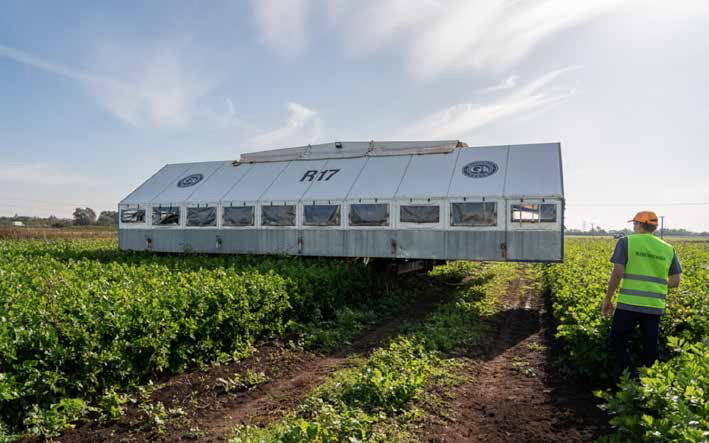
G’s Fresh is a third-generation family farm, growing 1.2 billion packs of produce each year on 14,000 hectares across the UK, Spain, the Czech Republic, Senegal and Poland. The business supplies the majority of the UK’s lettuce and celery. We were able to visit its organic celery field and see a mobile harvesting and packing factory in action. The in-house designed machine allows workers to harvest, wash, trim and flow-wrap celery in the field.
Words and images supplied by AUSVEG
“ Unlike Australia... overtime conditions in the UK and Europe do not have onerous penalty rates ”
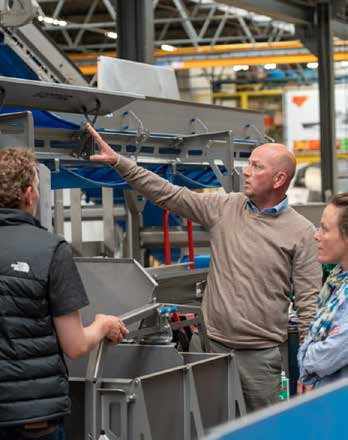
Netherlands-based Sormac specialises in fresh produce processing equipment, manufacturing everything in-house from software to hardware, and has offices in the US and UK.
Modern Slavery and Worker Treatment
As in Australia, unethical treatment of workers by a small minority of rogue employers does occur and appears to be largely driven by organised crime. Reputable growers finding themselves on the front page of a British tabloid is their worst nightmare, so there is a commitment to the ethical treatment of workers’ schemes and certifications. Large growers, such as G’s Fresh and Barfoots, have thousands of workers on multiple sites across the United Kingdom, so ensuring the welfare of their workers in no easy feat.
G’s alone has seven managers in its ethics team, all fully trained to SA800 (Social Accountability certification) and responsible for training every single G’s employee on modern slavery (from seasonal migrant to CEO) and undertaking hundreds of employee satisfaction surveys on an annual basis. Growers also audit their supply chain, including approved operators under the Seasonal Migrant Scheme. It was well known that organised crime gangs were constantly trying to infiltrate the system.
All employers we visited had very clear workplace signage around discrimination, abuse or unethical treatment. ‘Speak up’ hotlines were readily accessible either through third-party providers or inhouse. Other whistleblower platforms were available for people to report unethical behaviour.
Growers had a range of policies including a Human Rights Policy, Modern Slavery & Hidden Exploitation Policy, Responsible Use of Labour Providers Policy and Ethical Trading Policy. Policies are developed based on leading principles through organisations, such as the United Nations, Ethical Trading Initiative (ETI) and International Labour Organisation (ILO).
Given the pervasive nature of criminal gangs targeting migrants as easy cash, fresh produce businesses were constantly on alert to signs and reports of illegal activity. Two networks have been established in the UK to assist in intelligence and to proactively disrupt labour exploitation:
• Modern Slavery Intelligence Network (MSIN) A non-profit collaboration in the UK food and agriculture sector created in response to the findings of Operation Fort, the UK’s largest ever modern slavery investigation.
• Food Network for Ethical Trade (FNET) FNET creates a safe and collaborative space for food companies across the supply chain to share and learn from each other to improve human rights for workers in their operations and supply chains.
Automation fills the Gap
The use of automation in horticultural production is not new, however the transition to automation in recent years has been driven by lack of workforce. In some cases, machinery is no quicker or more efficient than humans, but it performs a job for which there may physically be no-one to fill the role. Machinery is often installed to undertake repetitive roles (such as putting produce in crates) or where the technology is as good (if not better) than the human thought/ judgement process, such as grading product by colour. Switching humans out of non-engaging repetitive roles into roles which require more mental stimulation is also better for the employees’ job satisfaction, as well as their health and wellbeing. We also found that companies were proactively installing machinery in less appealing work environments, such as where dust, temperature and moisture were negatively impacting the working conditions. Of course, with rising input costs and cost of living putting downward pressure on retail prices, automating some roles is also seen as a cost-saving measure. Surprisingly, although many of the UK growers would say unsurprisingly, the adoption of AI and robots has made little headway either in the packing shed or on the farm. A lack of tangible progress in effective automation of traditional handharvesting roles or some hand-processing line jobs was a frustration for the sector.
Attracting Local Workers
Managing the needs of migrant workers is a serious undertaking and some businesses were proactively fostering much stronger connections with their local community to fill worker shortfalls. This was more evident in workplaces that didn’t have the massive upward demand for seasonal harvest labour. In some cases, the business has had strong connections to their local town or county for decades, with second or third generations of employees working for the same company. Businesses are making packages more attractive for locals to attract and maintain staff. Some employers spoke about the benefit to local communities of keeping the wages in the local region rather than going to another country. Obviously, the feasibility of sourcing local labour was very reliant on the business, its operating model and the size and location of the nearby workforce. Regardless of the workforce policy, all companies we visited had a very strong commitment to their local communities through a vast array of programs, projects and initiatives, including land care projects, supporting local sports teams, food donations and school visits.
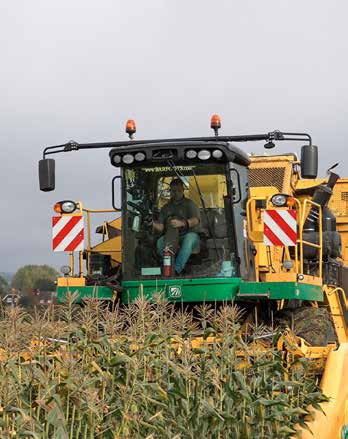
Barfoots of Botley is a major grower-processor in Bognor Regis, UK. It has expanded into international sourcing to supply its customers 52 weeks of the year, with a combination of its own farms around the world and a network of contract growers.
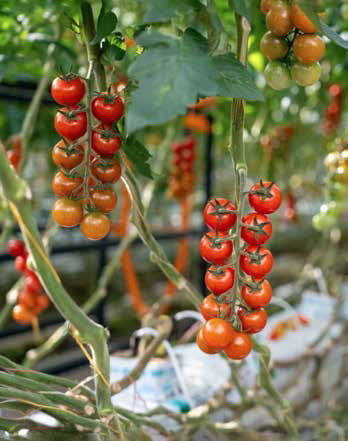
Tomatoworld is a demonstration site for the Dutch greenhouse sector. The facility is located in Westland, which boasts the world’s largest concentration of greenhouses.
“ ... all companies we visited had a very strong committment to their local communities ”
Lean Management
Like automation, lean management is not a new concept. Workforce shortages, rising input costs and downward pressure on prices have all made business look to efficiencies. Lean management was, however, evident in nearly every facility we went to with some businesses adopting more formal certification schemes, while others purely adopting the principles of lean management. ‘Upsizing’ was also very evident – larger harvest and storage bins for less handling, and larger, more powerful tractors and machinery for fewer workers and less time in a field.
What Success Looks Like
In terms of workplace culture and worker welfare, there were several take-home messages:
• Strong family values, and history of generational family connections with employees and the community.
• Company culture that permeates through the whole organisation, from the CEO right through to the casual workers.
• Tokenistic box ticking was not part of the workplace culture – if you say you are going to do something, then do it with conviction.
• Business management system based around people, quality and efficiency – success cannot occur unless all business facets are addressed.
• Diagnostic tools are used to assist in evidencebased decision-making.
• Operational decisions are done in consultation with HR or other areas of the business to ensure worker satisfaction.